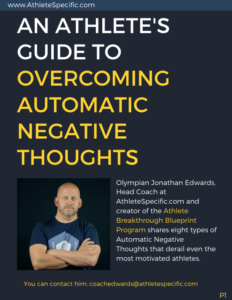Now I know, I know. “Athlete’s don’t have anxiety?” Yeah, right!
But it’s true.
Anxiety has become a bit of a buzz word these last few years. It’s almost become a badge of honour, for some, to have it.
People will tell you that you’re going to have it forever and you’re going to have to learn all of these techniques to manage it…
But it’s not true.
Anxiety isn’t something you are stuck with. And it’s not a bad thing either. In fact, for an athlete, it can be helpful.
You see, the line between anxiety and excitement is… well… not really a line at all.
The truth is that anxiety and excitement are one and the same, biologically speaking. How you interpret them is up to you.
Whether you feel aroused, or excited, your brain is sending the same signal to your body. Adrenaline starts to flow and your heart starts to beat faster. Your breathing starts to quicken to get more oxygen into your blood.
Your body then prepares for performance by pulling blood from your digestive tract (no need to be digesting any food right now, thanks) and sending it to your muscles so you can run, jump, or pivot quickly.
Your body is now ready to…go!
The problem is you’re usually no where near the field of play to use all of that energy.
So…you start saying things like, “Oh, I’m so nervous!!!”
And then the idea of “nervous” turns even more negative and someone, somewhere, made you start to think that you have…anxiety.
Nooooooooo!
You Shouldn’t Try and Stop a Freight Train
Let’s take a deep breath for a moment.
Actually, let’s not. Because that’s one of the first problems athlete’s create for themselves when they feel the little flutters of excitement coming on.
Somewhere along the way, we were told that feeling excited or nervous or anxious (they are all the same thing remember) was a bad thing. It’s not.
Sport Psychologists start to throw all of these techniques out there to try and control your breathing and lower your heart rate and take your mind off of things and these are all like trying to run in front of a moving freight train and trying to get it to stop. (Taking your mind off of things can help. More on that in a moment.)
Instead, by understanding what is happening to yourself physically, you can now re-assess what is happening in your body and how your brain is framing that thought.
Let’s say, you have a game coming up. Could be tonight. Could be next week. Here’s what’s going to happen.
Your brain is going to start and run some pictures of that game. Maybe you played this team before. Maybe it’s the playoffs. Doesn’t matter. Your brain starts running a little mental movie in your head like it’s actually happening.
You see, your mind doesn’t know what’s real or what’s imagined when there are some emotions attached to it. I’ll say that again…
Your mind doesn’t know the difference between what is real, and what’s imagined with emotion.
That’s right. So if you think of something about the game, but you don’t really dwell on it…you’re good. But when you start to put a little more emotion into it, like it’s got some more meaning, then your brain starts to think like it’s happening right now.
And that’s a problem. Because you’re probably sitting in math class, or trying to get to sleep. And because you have no where to burn off that energy your brain is signalling to your body…you start to freak out a little.
You’re Brain Is Helping You Perform At Your Best
As an athlete, if you understand that your brain is trying to help you, and not hurt you, you can take this energy and perform at a level you never have before.
Your brain is triggering all of the same chemical responses in your body that it would if you were trying to run out of a burning building, or evade an oncoming car coming down the road you’re trying to cross.
It’s pumping blood, and helping you to get more oxygen to your muscles. It’s widening your eyes and turning up the volume so you can hear better.
And when you look at it like that, don’t you see that all of those things are designed to help you run faster, jump higher, react quicker and make better decisions?
And aren’t those all things you really hope you can do when it matters?
Of course they are.
The “I’m Excited” Trick
A technique I use with all of my athletes is the “I’m just excited” trick. Actually, it’s not a “trick” as it’s been studied and proven at Harvard. Just FYI.
If understanding what is going on with your body isn’t enough to turn this around, using the words “I’m excited” can help.
Dr. Allison Wood Brooks at Harvard took groups of students and had them sing “Don’t Stop Believin'” By Journey in front of a group. Before they sang, she had one group say to themselves, “I’m excited.” and the other group just said, “I’m anxious.”
Well, you can imagine, the group that said “I’m excited” not only felt more excited but they actually sang better. (They actually confirmed that using a computer that measured how loudly and how accurately they sang the song.)
They even replicated this study with another group of students who were asked to give a two minute speech. The excited group were described as more confident and persuasive.
You’re Not Trying To Fight for “Calm”
One of the biggest myths and out-dated and rehashed ideas is that you should be calm in order to perform at your best.
A study done with students taking a math test proved just that. One group was told to reframe their nervousness about the test as “I’m excited” and the other group was told to “Remain calm.” Guess who performed better on the test? You guessed it…the excited ones.
And here’s the kicker…both groups, whether they felt excited or they felt anxious had the exact same things going on in their body.
Heart rate was the same. Breathing was the same. By framing the situation and the feeling as excitement as opposed to anxiety did actually nothing to what the body was doing on the inside.
Challenge Mindset or Threat Mindset
When you frame how you’re feeling as “excited” you are actually looking at the situation differently. You are taking the experience as a challenge and you are then starting to see the good that can come out of it. As opposed to a “threat mindset” where you dwell upon what could go wrong because you’re oh, so, nervous.
One of my clients in our Athlete Breakthrough Blueprint program is a high ranking golfer who came to me struggling with distance and accuracy issues. After explaining to them just how they could apply this type of thinking to their game we increased his yardage AND his fairways hit as well as increasing his greens in regulation by close to twenty percent!
So in conclusion, athlete’s don’t have anxiety. In fact, no one has anxiety. What they do have is a natural response. Their brain and their body are doing what they do best and it’s up to the athlete to reframe the situation so they can take advantage of those biological feelings.
So let me ask you…what are you going to do now that you know just how this works? Leave me a comment below.

